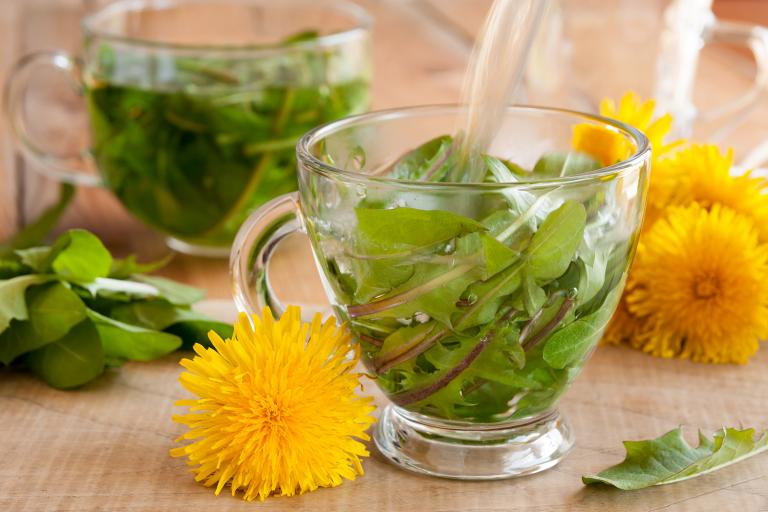After a season of excess we naturally crave a fresh start. For many, this begins with a whole-body detox to reboot and reset for healthier habits.
On the product shelves, a “detox” often comes in kit form.
Let’s take a closer look at how to support your key eliminatory organs: the liver, kidneys, colon, lymph, and skin.
Detoxifying "Alteratives"
Old-time herbal doctors used the term “alteratives” to refer to herbs that help the body return to a healthier state via the gentle stimulation of our eliminatory channels’ natural function. Liver and lymph “moving” herbs play a key role in this category, though many also stimulate healthy elimination via the colon.
We’re not talking about harsh laxatives. Alteratives are herbs that could be taken long-term and encourage the body to resume healthy function on its own. Laxatives like senna, cascara, and aloe latex force the body to purge and quickly become habit-forming.
-
Liver Movers (Cholagogues)
Your liver filters toxins and waste from the blood, turning them into bile, which is excreted via the colon. Bile helps digest fats on its way out, and poor fat digestion and skin issues indicate that you might want to try cholagogues. Liver-moving alteratives include dandelion root, artichoke leaf, burdock root, and yellow dock root.
Turmeric root, schisandra berry, and milk thistle help protect and heal the liver. You’ll find these ingredients in many cleanse kits, tinctures, and detox tea blends. They taste mildly to strongly bitter—a flavor associated with improved liver detoxification, increased digestive function, and stimulation of the wavelike muscle motion that moves food through the gastrointestinal tract (which indirectly encourages bowel movements).
Turmeric, burdock, and dandelion also can be incorporated into your culinary repertoire.
-
Lymph Movers (Lymphagogues)
It’s easy to take your lymphatic system for granted. These tiny vessels closely align with your circulatory system, cleaning the fluid around your cells, outside the bloodstream. Lymph vessels also house many of your immune cells. Lymph hubs called nodes clean up debris before the lymph gets dumped into the bloodstream.
Lymph has no pump and flows through the body via pressure from your moving body around the vessels; valves ensure the flow goes in the right direction. Signs of sluggish lymph include skin issues, mild edema (edema can signal more serious issues too), and a sluggish immune system. Regular movement, lymphatic massage, compression stockings, and skin brushing help move it along.
You can also add lymphagogues that help thin the lymph and stimulate filtration. Favorites include red clover blossoms, burdock root, red root, schisandra, and calendula blossoms, which can be taken in tea, pills, and liquid extracts.
-
Colon Movers (Gentle, Indirect Laxatives)
Because the liver’s waste (bile) exits via the colon in your feces, it’s important to keep things moving along or the result of all your liver’s hard work gets reabsorbed into the body. If you tend toward constipation, slow digestion, and/or you have fewer than one bowel movement per day, give your colon some TLC.
Many kits go for the big-gun laxatives, but I prefer a gentler approach that encourages healthy, regular bowel movements.
- First steps include bitter-tasting herbs (the cholagogues), proper hydration, and gently increasing fiber via whole foods in the diet and supplements like ground flax, psyllium, or chia seeds.
- If you need a little more encouragement, both triphala and yellow dock root contain low doses of laxative constituents and also tone the colon.
- Magnesium encourages bowel movements by bringing water into the colon.
-
Kidney Movers (Diuretics)
Like the liver, your kidneys filter your blood. However, the kidneys remove different compounds and excrete them via your urine. If you pee infrequently and have dark, stinky urine, consider supporting your kidneys. The three best ways to do this are to drink more water, eat more green vegetables, and reduce meat consumption, especially processed meat.
Our safest kidney tonic diuretics (which make you pee more) include parsley leaf, dandelion leaf, nettle leaf, burdock root, and corn silk. These are best delivered in a water medium like tea or broth, or in food, though they can be added to broader detox formulas in liquid extract or pill form.
Detox Herb Precautions
- Detox herbs to reset and reboot a sluggish system should not be expected to “cure” kidney or liver disease—these require medical attention.
- Seek professional guidance if you are pregnant, nursing, have heart disease, kidney disease, liver disease, or diabetes. Doing a detox and using detoxifying herbs may be unsafe or need to be tailored to your needs.
- Detoxifying herbs work best with adequate sleep, hydration, a healthy whole foods diet rich in plant foods, regular activity, and avoidance (to the best of your ability) of toxins.
- See the Consumer Guides on the Environmental Working Group website (www.ewg.org) for tips on avoiding toxins in day-to-day life.
Bitter Brew Detox Tea
This is a nice coffee substitute with broad detoxifying actions.
Ingredients
- 1 tsp burdock root
- 1 tsp dandelion root
- 1 tsp roasted chicory root
Directions
- Simmer herbs in 8 to 16 ounces of water for 20 minutes; strain.
- If desired, sweeten with blackstrap molasses and add unsweetened almond, hemp, or coconut milk.

